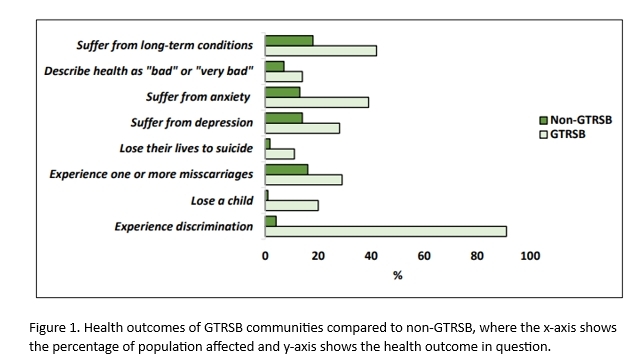Decolonising the curriculum is an ongoing process in our Universities as we identify areas where we can challenge the bias that has meant that marginalised communities are excluded from our traditional teaching approaches (1). To support this we need our students to be partners and agents of change, helping to improve and invigorate our physiology and medical science teaching. In this case study a final year Honours project focuses on contextualising healthcare inequalities faced by Gypsy, Traveller, Roma, Showmen and Boaters (GTRSB) communities to collate relevant information and consider how it could be best utilised in future teaching and outreach events.
A narrative review of Ovid and PubMed databases revealed a lack of peer-reviewed research publications, therefore a grey literature search of governmental, parliamentary and charity publications was performed to fill knowledge gaps (2,3). This produced 12 peer-reviewed papers and 28 grey literature sources which were synthesised to describe: who GTRSB communities are; moments of their history which may impact on current healthcare inequalities with a focus on the Tinker Experiments in Scotland and forced sterilisations of Roma women in the Czech Republic; present-day disparities in healthcare outcomes of GTRSB communities compared to mainstream society; proposed drivers of current healthcare inequalities; and proposed routes for improvement through education. Examples of the inequalities include: 6-7x higher suicide rates; reduced life expectancy by 10-15 years; 20x higher premature death of an offspring; 2-4x times higher risk of death/hospitalisation following COVID-19 diagnosis; all data compared to the wider population. A poster session within the Honours project timeline allowed some of the data to be presented to staff and students within Medical Sciences at the University of Aberdeen. This revealed a significant lack of knowledge of the GTRSB communities, their history, and current healthcare inequalities.
This work offers a unique Scottish and Central/Eastern European perspective on the topics of health inequalities and GTRSB communities. It has revealed that decolonising our curriculum can highlight bias and racism in our current approaches to communities that are often unseen in medical science teaching. Based on the lack of awareness of these issues within our own University community, and the scale of the healthcare inequalities identified, the next steps will focus on working with the diverse GTRSB communities to create inclusive teaching resources. We will use a community-informed activist-based model to improve our teaching and outreach.

